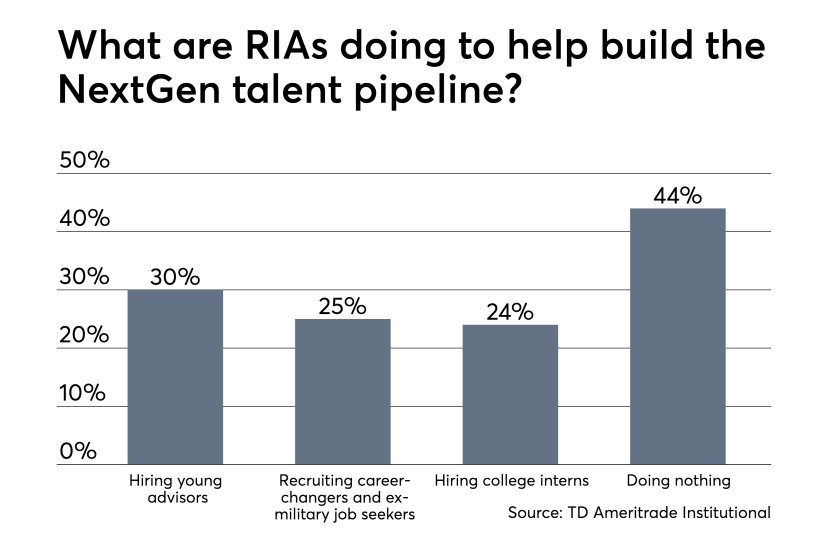
(Financial Planning) I began my career as a financial advisor in my mid-20s shortly after the dot-com crash. My six-month, classroom-based training program was composed of some of the most talented, credentialed and ambitious people I’ve ever encountered. Yet after two years, only 10% of the class had brought in enough assets to hit their revenue targets.
While I was extremely proud to be among the successful group, I was appalled by the fact that 90% of my training class failed. I always tell people who enter this industry to never forget that you were talented before you walked into your firm and you will be just as talented if you leave and things don’t work out. If you fail in this business, you should not let it define you.
Conversely, if you succeed, don’t give yourself too much credit. Many financial advisors fail because they are given bad advice.
I recently attended a conference sponsored by the Association of African American Advisors (Quad-A) that was overwhelmingly attended by brand new (re: millennial) financial advisors. Just like my training class, this group was eager to have a positive impact and excited to embark on a promising career of helping people reach their financial goals.

But many of these newbies will fail because of a dirty little secret in our industry — sometimes, no matter how good you are at advising, you won’t excel unless you can sell and bring in clients.
In my training program I learned how to sell. I learned selling was not about simply describing the features and benefits of a product or probing for the needs of the prospect. Selling was about making a genuine connection with the person. At Goldman Sachs, there is an old saying that clients do business with you for three reasons — first they like you; second, they think you’re smart and third, they trust you.
In other words, likeability is the gateway to success as an advisor. If your prospects don’t like you, it doesn’t matter if they think you’re smart — they will never have an opportunity to trust you.
And although likeability sounds like an unwinnable high school popularity contest, it can actually be taught.
For example, the more you let the prospect talk, the more they will like you. People want to be heard. They want you to make them feel important by asking them good questions that get them to open up. This tactic runs counter to what many salespeople think they must do — TALK their way into a close. Instead, you must LISTEN your way into the close. If you are paying attention, the prospect will give you all of the hooks you need to close their business.
Another example is simply paying attention. When I was actively in sales mode, I always preferred to visit the prospect at their home or office. It was not just because I wanted to cater to their convenience, I also wanted the opportunity to conduct research. During the meeting, I’d ask questions about the photos on the walls and strike up conversations about the souvenirs and trinkets on their desks. It is these dialogues that lead to common ground, the fertile soil in which relationships grow.
Here are some myths in our industry that can hobble young advisors and action steps for overcoming them:
Myth 1: Young advisors should pursue young clients
We are led to believe this because our industry is overrepresented by older advisors and many of the clients with significant means also happen to be older. In my experience, many older clients love young advisors, perhaps because you remind them of themselves when they were younger. Maybe it’s because they want an advisor who can build a connection with their heirs, or be around long enough to help their assets transition to the next generation. Some want an advisor who will not only outlive them but also won’t retire at the same time as them. The older advisors in your office will never tell you this.
Action step: Instead of pursuing your friends as clients, go after their parents! This advice also holds true for attracting the best wedding gifts — invite your friend’s parents to the wedding!
Myth 2: Young advisors should start with small accounts
My favorite scene in the movie “The Pursuit of Happyness” is when Will Smith didn’t have time to start at the bottom of the list for his cold calls, so he started at the top with C-suite executives. Here’s the problem with landing small clients: you fall in the trap of over servicing them, which leads to poor time management and disappointment as you give clients unrealistic expectations around service.
Action step: Use your college or community networks to identify the children of wealthy families. These kids aren’t hard to find because many of them are proud of their family’s success. They also love looking smart in front of their parents by introducing them to smart professionals who can make them look good.
Myth 3: Young advisors should build a business through networking — not cold- calling
This would be good advice if you had unlimited time to build your business. It took me two years to land my first multimillion-dollar client through networking and nearly three years before a client referred me a piece of business. If I exclusively pursued this strategy, I would have starved. The keys to cold-calling are research and persistence. You have to have an actionable angle. A change in circumstance creates opportunity — for example, a merger that results in the closure of a 401(k) plan. Or the sale of a company that results in newfound liquidity. Persistence matters because it may take a few attempts to get their attention.
Action step: Don’t get discouraged. When I was cold-calling, I used to tell myself that I only had to make 1,000 such calls in my entire life, and each one I made was one less that I’d ever have to make. Maybe your number is 2000?
Myth 4: Young advisors must develop a niche
The best advice I received about building a business is that everything works and nothing works. You have to constantly reinvent your target market before you fall into your niche. I remember researching cardiothoracic surgeons because I read an article saying they were the highest-paid doctors. I literally called every single one in New York City — including Dr. Oz before he became a celebrity! The first surgeon had a few million dollars, which led me to think I had hit the jackpot. Then I met with several more heart surgeons who had substantially fewer assets before realizing I had gotten lucky with my first guy — his wealth was from an inheritance.
Action step: Try a number of different avenues until you find your groove. Don’t just think industry or demographic — it could also be lifestyle or personality.
Finally, don’t be fooled into believing everyone who’s successful at your firm achieved their success through simply working hard. Some people inherited their clients from other advisors who abandoned them when they left the business. Some just got lucky, being at the right place at the right time. Remember, luck is not a strategy, but it helps.



